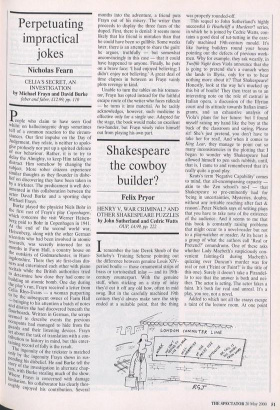Perpetuating impractical jokes
Nicholas Fearn
CELIA'S SECRET, AN INVESTIGATION by Michael Frayn and David Burke
faber and faber, £12.99, pp. 110
People who claim to have seen God whilst on hallucinogenic drugs sometimes tell of a common reaction to the circum- stances. Our first impulse on the Day of Judgement, they relate, is neither to apolo- gise profusely nor put up a spirited defence of our behaviour. Rather, it is to try to delay the Almighty, to keep Him talking or distract Him somehow by changing the subject. More sober citizens experience similar thoughts as they flounder in disbe- lief on discovering they have been taken in by a trickster. The predicament is well doc- umented in this collaboration between the actor David Burke and a sporting dupe Michael Frayn. Burke played the physicist Niels Bohr in the first cast of Frayn's play Copenhagen, Which concerns the visit Werner Heisen- berg paid to Bohr in Copenhagen in 1941. At the end of the second world war, Heisenberg, along with the other German scientists who had been involved in atomic research, was secretly interned for six Months in Farm Hall, a country house on the outskirts of Godmanchester, in Hunt- ingdonshire. There they ate first-class din- ners and entertained each other with piano recitals while the British authorities tried to determine how close they had come to building an atomic bomb. One day during C! :play's run, Frayn received a letter from
ia Rhys-Evans — a woman purporting to be the subsequent owner of Farm Hall
bringing to his attention a batch of notes and diaries she had discovered beneath the floorboards. Written in German, the scraps seemed to describe events the previous occupants had managed to hide from the guards and their listening devices. Frayn set about the task of translation with a con- tribution to history in mind, but this enter- taining record of folly is the result. _ The ingenuity of the trickster is matched utilY by the ingenuity Frayn shows in sus- p_ending his disbelief. He and Burke tell the ,41_°rY of the investigation in alternate chap- „,ters, with Burke stealing much of the show. ,‘Y, here. Frayn is concerned with damage ourtill it i ka,.ion, his collaborator has clearly thor- gulY enjoyed his contribution. Several months into the adventure, a friend puts Frayn out of his misery. The writer then proceeds to display the three faces of the duped. First, there is denial: it seems more likely that his friend is mistaken than that he could have been so gullible. Some weeks later, there is an attempt to share the guilt: he argues, truthfully — but somewhat unconvincingly in this case — that it could have happened to anyone. Finally, he puts on a brave face: 'I had enjoyed believing; I didn't enjoy not believing.' A great deal of time elapses in between as Frayn vainly plots revenge in kind.
Unable to turn the tables on his tormen- tor, Frayn has opted instead for the faithful escape route of the writer who faces ridicule he turns it into material. As he tacitly acknowledges, however, such medicine is effective only for a single use. Adapted for the stage, the book would make an excellent two-hander, but Frayn wisely rules himself out from playing his own part.









































































 Previous page
Previous page